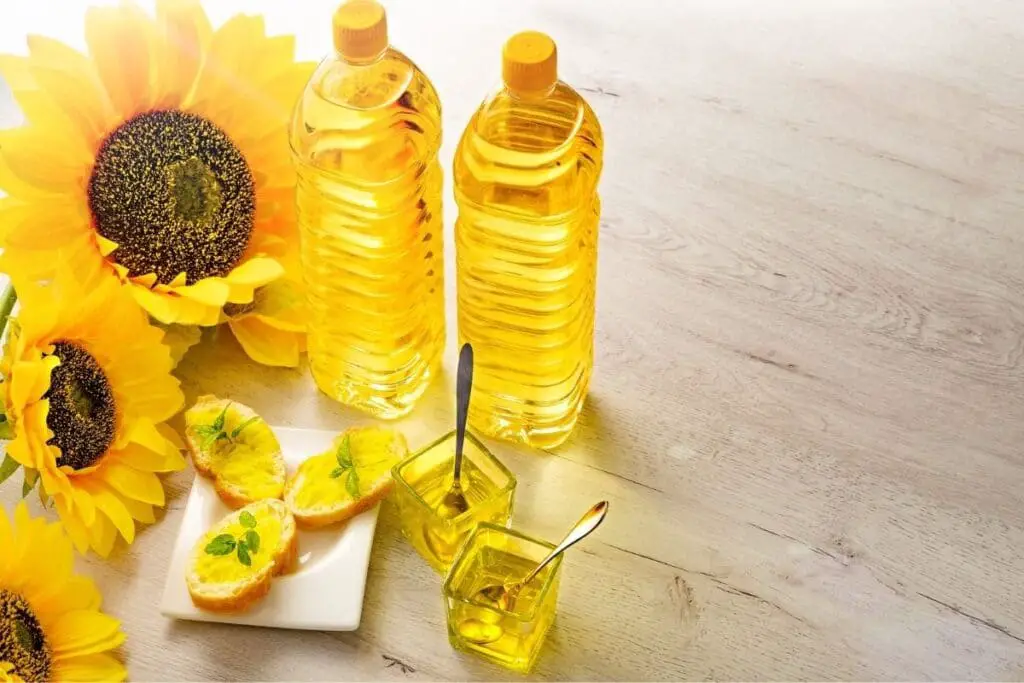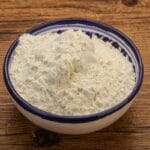Quick summary: Yes, vegetable oil can go bad, primarily due to becoming rancid over time. The shelf life of vegetable oil depends on its type, storage conditions, and whether it’s opened or unopened.
You have stocks of vegetable oil and other cooking oils that you found in the pantry, and you are not sure if you can use them, or you have to throw everything in the trash? Find out everything you want to know in our article.
Along with flour, sugar, and salt, vegetable oil is probably one of the most common foods that people buy in stock. For any crisis, you want to have enough basic means of nutrition. As we saw during the pandemic, most people opted for stockpiling vegetable oil and some other products. Most often, it’s sunflower oil, but there are numerous types. Corn oil, peanut oil, avocado oil, canola oil, sesame oil, coconut oil, palm oil, and so on. Whatever fatty plant you can think of, probably there’s an oil product from it.
What to do when you realize you have a dozen gallons of oil that you haven’t consumed, and it’s been maybe a year, or their expiration date has already expired? Well, to begin with, we can tell you that vegetable oil is definitely susceptible to spoilage, without a doubt. However, durability will also be affected by how you store it, so here’s the essential information to keep in mind.
How Long Vegetable Oil Lasts?
Vegetable oil is susceptible to spoilage, as we have already written. In fact, the biggest problem will be that the oil becomes more and more rancid over time, and this is a process that can be slowed down by proper storage, but it can never be stopped. Therefore, over time, the oil will become very rancid sooner or later. It is challenging to be a prognosticator of the exact duration, but you can follow some guidelines.
Unopened vegetable oil
There’s always a best before date on the packaging, but you don’t have to stick to it strictly. If you have unopened bottles of oil that have recently expired, you can use them without much thought. You can roughly count on unopened oil to be suitable for at least another three months after the expiration date. This time may be longer if the storage conditions are favorable, but the maximum duration will be six months after expiration. It is unlikely that the oil will not be rancid after that.
Opened vegetable oil
There are different tips on how long you can keep the cooking oil once you open it. Oxygen supply allows the deterioration faster, so opening the bottle is definitely a procedure that will lead to spoilage. The safest prognosis is that you should use the oil within three months of opening it. However, it is very likely that the oil will be good for at least six months and that you can use the oil in your diet without any worries within that period.
Can Cooking Oil Go Bad?
Vegetable oil has its own shelf life, and it is not even as long as you might expect since it is a fatty product. It is difficult to say at first whether the oil is spoiled or not, but certain signs can make it easier for you to recognize expired oil. Certainly, vegetable oil will last somewhat longer than extra virgin olive oil.
Sign 1: Smell is wrong
Vegetable oil should have a relatively neutral odor that is by no means unpleasant, and it is definitely a spoiled product if you smell a robust rancid smell like metal. So, smell the oil when you open the bottle for the first correctness test.
Sign 2: It has mold on cap
Mold is a hazardous phenomenon for health, especially if it is a product that you do not heat-treat. Mold will primarily be seen on the cap or on top of the bottle of vegetable oils, and if you notice it, you’d better throw it all in the trash. True, if you use such oil for frying, the mold will be destroyed, but regardless, for your safety and enjoyment of eating, replace the oil with fresh.
Sign 3: The taste is not right
If the smell is not unusual and you do not notice mold but still doubt whether everything is OK, you can try to put a small amount of oil in your mouth and assess whether everything is correct. If the taste seems unusual, metallic, or a little astringent, it means you have a rancid vegetable oil.
What Is The Best Way To Store Vegetable Oil?
Although proper storage is important for all foods, for most cooking oils, it will make a difference in the months before the oil becomes rancid. So follow a few simple guidelines and make sure your vegetable oil lasts as long as possible.
Tip 1: Be sure to store in a dark and cool place
Vegetable oil does not tolerate heat or any heat sources. It also dislikes light because it will improve oxidation. So, the worst place to store will be the one that is warmer than a comfortable room temperature and reached by the sun’s rays. Choose a cozy cooler pantry or a place in the kitchen cabinets that is not close to the heat source.
Tip 2: Seal well after use
As we have already said, the air is not a friend of vegetable oil because it will speed up the rancid process. So always close the vegetable oil bottle well after use and do not leave the bottle open for too long while cooking.
FAQs
How can you tell if vegetable oil is bad?
You can tell if vegetable oil is bad by checking for an off smell, a rancid or sour odor, and changes in color or consistency. If the oil has an unusual taste or emits a strong unpleasant scent, it’s likely rancid and should be discarded.
Is it OK to use expired vegetable oil?
No, it’s not advisable to use expired vegetable oil, as its quality, flavor, and nutritional value may have deteriorated. Consuming expired oil could lead to an unpleasant taste in your dishes and may not provide the desired cooking results.
Should vegetable oil be refrigerated after opening?
No, vegetable oil does not need to be refrigerated after opening. As long as it is stored in a cool, dark place away from direct sunlight and heat. Keeping the container tightly sealed helps prevent air and moisture from affecting the oil’s quality.
Conclusion
Vegetable oil is a very common choice for preparing foods by frying or baking. We also add it to salads and fresh dishes, and that is why it is extremely important that the oil is correct and tasty. Regarding the durability of vegetable oils, you can have only a rough estimate. Proper storage will make a huge impact.
The average shelf life of vegetable oil is approximately 18 months, and it should be good for around three months after the expiration date. You will most easily recognize spoiled oil by its unpleasant metallic smell, which will be a sure sign that the product is rancid.
See more:
*image by carloscastilla/depositphotos









